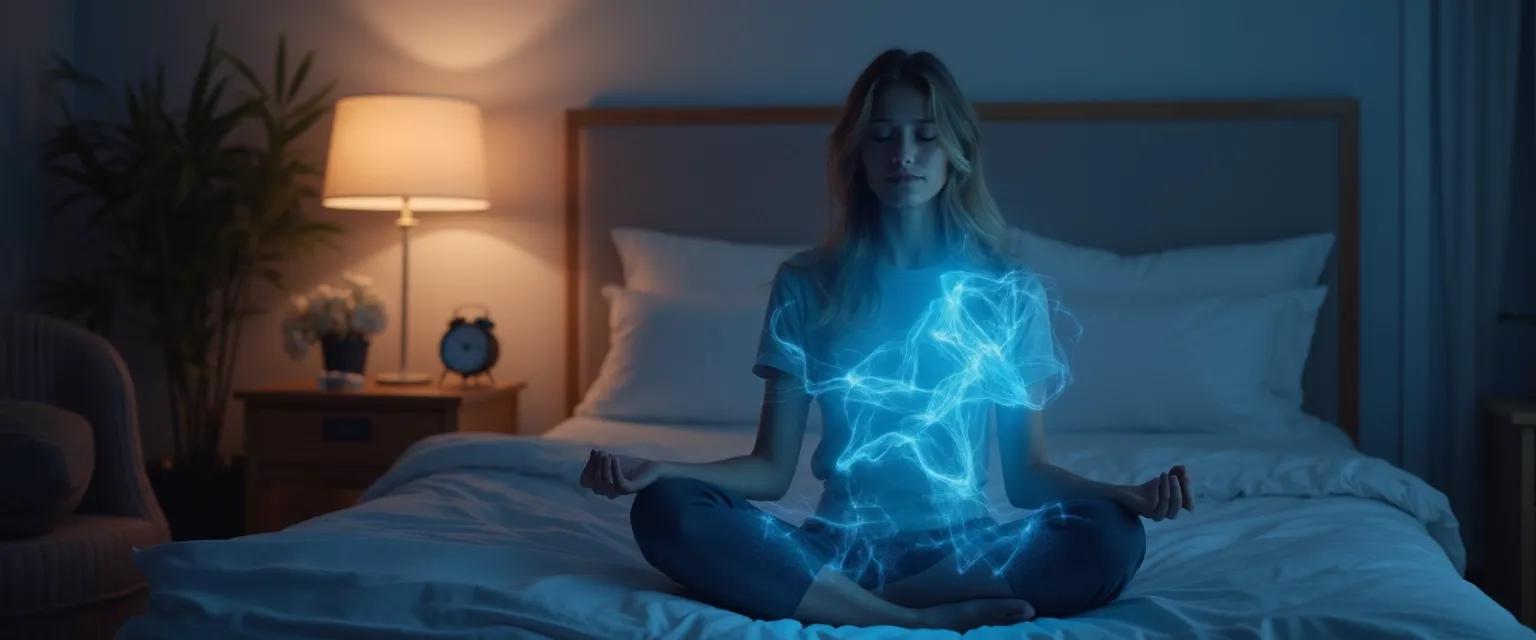5-Minute Bedtime Breathing: Mindfulness Meditation for Sleep and Anxiety
Ever found yourself lying in bed, eyes wide open, with a mind that just won't quit? You're not alone. That nightly mental marathon affects millions, transforming what should be peaceful bedtime into a battleground of racing thoughts. Mindfulness meditation for sleep and anxiety offers a remarkably effective solution that doesn't require hours of practice or complicated techniques. These ultra-short breathing exercises are specifically designed for those moments when your brain seems determined to review every worry, plan, and random thought instead of powering down for sleep.
The beauty of mindfulness meditation for sleep and anxiety lies in its simplicity. Research shows that even five minutes of focused breathing activates your parasympathetic nervous system – your body's built-in relaxation response. Unlike elaborate sleep routines that often feel like another item on your to-do list, these quick relaxation techniques require minimal effort while delivering maximum calming benefits. They're perfect for when you're already lying down, tired but wired, seeking that elusive off-switch for your thoughts.
These 5-minute techniques transform bedtime struggles by creating a mental transition zone between daytime activity and sleep. Rather than fighting against your restless mind, you'll learn to guide it gently toward quieter waters – all while remaining comfortably in bed.
3 Essential Mindfulness Meditation for Sleep and Anxiety Techniques
The most effective mindfulness meditation for sleep and anxiety practices are those you'll actually use consistently. These three techniques require no special equipment or extensive training – just your breath and a few minutes of attention.
The 4-7-8 Breathing Technique
This powerful breathing pattern works by activating your parasympathetic nervous system, essentially telling your body it's safe to relax. Here's how to practice it:
- Inhale quietly through your nose for a count of 4
- Hold your breath for a count of 7
- Exhale completely through your mouth for a count of 8, making a whooshing sound
- Repeat this cycle 3-4 times
The 4-7-8 technique works because the extended exhale naturally slows your heart rate and reduces stress hormones in your bloodstream – exactly what's needed to counter those racing thoughts.
Body Scan Breathing
This technique combines breath awareness with progressive relaxation, perfect for when tension has settled into your body:
- Start with slow, deep breaths
- Beginning at your toes, notice any tension as you breathe in
- As you breathe out, imagine that tension melting away
- Move gradually up through your body – feet, legs, torso, arms, neck, and head
This mindfulness meditation for sleep and anxiety approach is particularly effective for those who hold stress physically, as it systematically releases tension while redirecting attention away from worrisome thoughts.
Counting Breath Meditation
When your mind is especially busy, this simplest technique offers an effective anchor:
- Breathe naturally and comfortably
- Count "one" on your inhale, "two" on your exhale
- Continue counting up to ten, then start over
- If you lose track, gently begin again at one
This technique is perfect for highly active minds because it gives your brain just enough to focus on without requiring complex instructions when you're already tired.
Creating Your Personalized Mindfulness Meditation for Sleep and Anxiety Routine
Building consistency with your bedtime mindfulness practice doesn't require perfect conditions or lengthy sessions. Start with just 5 minutes a night, focusing on whichever technique feels most natural. The key is making it a non-negotiable part of your bedtime sequence – like brushing your teeth or setting your alarm.
On particularly restless nights, try combining techniques. Begin with 4-7-8 breathing to activate your relaxation response, then transition to the body scan to release physical tension, and finally use counting breaths as your runway into sleep. This layered approach provides multiple opportunities for your mind to settle and find calm.
Common obstacles include forgetting to practice, falling asleep before completing the exercise (which is actually success!), or becoming frustrated when thoughts continue to intrude. Remember that mindfulness isn't about achieving perfect mental silence – it's about gently returning to your breath each time you notice your mind has wandered.
The benefits of regular mindfulness meditation for sleep and anxiety extend beyond better sleep. Many practitioners report decreased daytime anxiety, improved focus, and greater emotional resilience. These five-minute investments build cumulative benefits, creating neural pathways that make relaxation increasingly accessible when you need it most.
With these simple mindfulness meditation for sleep and anxiety techniques, bedtime can transform from a struggle into a welcome opportunity to release the day and prepare for restorative sleep. Your mind deserves this brief pause – these few minutes of gentle attention that bridge the gap between wakefulness and rest.




